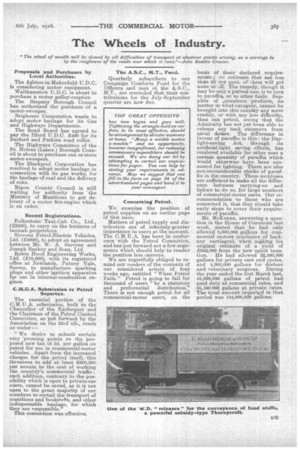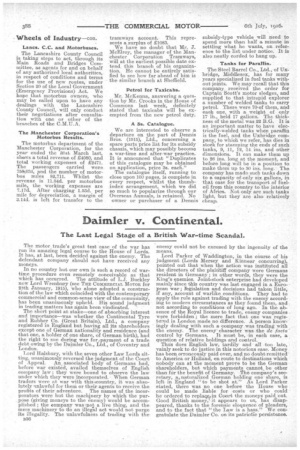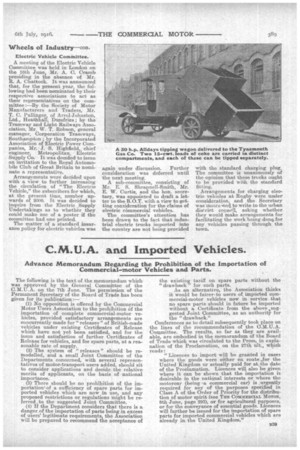The Wheels of Industr.
Page 9

Page 10

Page 11

If you've noticed an error in this article please click here to report it so we can fix it.
Proposals and Purchases by Local Authorities.
The Aphton-in-MakerfieId U.D.C. is considering motor equipment. Walthamstow U.D.C. is about to purchase a motor gulley-emptier. The Stepney Borough Council has authorized the purchase of a motor-sweeper.
Brighouse Corporation wants to adopt motor haulage for its Gas and Highways Departments.
The Road Board has agreed to pay the Ilford U.D.C. £400 for its
arf or d and Perkins road roller.
The Highways Committee of the St. Helens (Lanes.) Borough Council is about to purchase one or more motor-sweepers.
The Blackpool Corporation has resolved to adopt motor haulage in connection with its gas works, for the haulage of coal and the delivery of coke.
Ripon County Council is still waiting for authority from -the Ministry of Munitions to get delivery of a motor fire-engine which is on order.
Recent Registrations.
Folkestone Taxi-Cab Co., Ltd., (22500), to carry on the business of taxicab proprietors. Stevens Petrol-Electric Vehicles, Ltd. (Z3000), to adopt an agreement between Mr. W. A. Stevens and Joseph Sankey and Sons, Ltd. Robin Hood Engineering Works, Ltd. (RI0,000), with its registered office at Newlands, Putney Vale, Surrey, to manufacture sparking plugs and other ignition apparatus fcr use in internal-combustion engines.
C.M.U.A. Submission re Petrol Supertax.
The essential portion of the C.M.U.A. submission, both to the Chancellor of the Exchequer and the Chairman of the Petrol Control Committee, as put forward by the Association on the 23rd ult., reads as under :—
" We desire to submit certain very pressing points re the proposed new tax of 3d. per gallon on petrol for use in commercial-motor vehicles. Apart from the increased charges for the petrol itself, this threatens to add at least 2600,000 per annum to the coat of working the coantry's commercial traffic : such addition, contrary to the possibility which is open to private-car users, cannot be saved, as it is not open to the great majority of our members to curtail the transport of munitions and foodstuffs, and other indispensable haulage, for which they are responsible."
This contention was effective. The A.S.C., M.T., Fund.
Quarterly subscribers to our Campaign Comforts Fund for the Officers and men of, the A.S.C., ALT., are reminded that their contributions for the July-September quarter are now due.
Concerning Petrol.
We examine the position of petrol supplies on an earlier page of this issue.
Matters of petrol_ Supply and distribution are of infinitely-greater importance to users at the moment. The C.M.U.A. has been in conference with the Petrol Committee, and has put forward not a few arguments which should help to render the position less onerous. We are regretfully obliged to remind oler readers of the contents of our considered article of four weeks ago, entitled "When Petrol Fails." Petrol is going to fail for thousand of users "by a statutory and preferential distribution." There is not enough petrol for all commercial-motor users, on the
basis of their declared requirements ; we estimate that not less than. 25 oer cent. of' them will get none at ell. The remedy, though it may be only a pal-m.1 one, is to turn to paraffin., or to other fuels. Supplies of petroleum products, no matter in what category, cannot be brought into this country any more readily, or with any less difficulty, than can petrol, seeing that the Admiralty has not yet been able to release any tank steamers from naval duties. The difference in favour of paraffin is this : the Daylight-saving Act, through its artificial-light aaving effects, has rendered available for other uses a certain quantity of paraffin which would otherwise have been consumed for lighting. There are also not-inconaiderable stocks of paraffin in the country. These surpluses are sufficient.to make all the difference between carrying-on and failiae to do so, for large numbers of commercial-motor users. Our recommendation to those who are concerned is, that they should take early steps to cover their requirements of paraffin.
Mr. McKenna, answering a question in the House of Commons last week, stated that he had only allowed 8,000,000 gallons for commercial motors (exclusive of hackney carriages), when making his original estimate of a 'yield of 2962,000 from the new spirit taxation. He had allowed 32,500,000 gallons for private cars and cycles, and 4,000,000 gallons for doctors and veterinary surgeons. During the year ended the 31st March last, 48,500,000 gallons of petrol had paid duty at commercial rates, and 65,100,000 gallons at private rates. The total amount imported in that period was 144,000,000 gallons. Lancs. C.C. and Motorbuses.
The Lancashire County Council is taking steps to act, through its Main Roads and Bridges Committee, as agents for and on behalf of any authorized local authorities, in respect of conditions and terms for the use of new routes, under Section 20 of the Local Government (Emergency Provisions) Act. We hope that motorbus owners, who may be called upon to have any dealings with the Lancashire County Council, will only conduct their negotiations after consultation with one or other of the branches of the C.M.U.A.
The Manchester Corporation's Motorbus Results.
The motorbus department of the Manchester Corporation, for the year ended the 31st March last, shows a total revenue of .24080, and toted working expenses of 22471. The passengers carried were 758034, ,and the number of motorbus miles 82,711. Whilst the revenue is 11.84d. per motorbus mile,, the working expenses are 7.17d. After charging 1.53d. per mile for depreciation, a margin of 3.14d. is left for transfer to the tramways account. This represents a surplus of 21083. We have no doubt that Mr. J. McElroy, the manager of the Manchester Corporation Tramways, will at the earliest possible date extend this branch of his organization. He cannot be entirely satisfied to see how far ahead of him is the similar branch at Sheffield.
Petrol for Taxicabs.
Mr. McKenna, answering a question by Mr. Crooks in the House of Commons last week, definitely stated that taxicabs will be exempted from the new petrol duty.
A 5s. Catalogue.
We are interested to observe a departure on the part of Dennis Bros. (1915), Ltd., concerning a spare parts price list for its subsidy chassis, which may possibly become a war-time and after-war practice. It is announced that "Duplicates of this catalogue may be obtained on application, price as. each." The catalogue itself, running to close upon 100 pages, is complete in every respect., whilst the thumbindex arrangement, which we did so much to popularize through our Overseas Annuals, is retained. No
subsidy-type vehicle will heed to spend more than half a minute m settling what he wants, on reference to the list under notice. It is also neatly corded to hang up.
Tanks for Paraffin.
The Steel Barrel Co., Ltd., of Uxbridge, Middlesex, has for many years specialized in fuel tanks without joints. We may recall that this company received the order for Captain Scott's motor sledges, and supplied to that intrepid explorer a number of welded tanks to carry petrol. There were 70.of them, and each one, with a weight of only 17 lb., held 17 gallons. The thickness of the metal was 22 B.G. It is an important matter to have electrically-welded tanks when paraffin is the fuel, and the Uxbridge company, to which we refer, has dies in stock for stamping the ends of such tanks, 9, 11, 12, 14 ins, and other dimensions. It can make them up to 28 ins. long at the moment, and before long will be in a position to make them up to 30 ins. long. The company has made such tanks down to a capacity of only six gallons, in that case for the transport of fueloil from this country to the interior of Africa. Not only are such tanks light, but they are also relatively Electric Vehicle Committee.
A meeting of the Electric Vehicle Committee was held in London on the 16th June, Mr. A. 0, Cramb presiding in the absence of Mr. R. A. Chattock. It was announced that, for the present year, the following had been nominated by their respective associations to act as their representatives on the committee :—By the Society of Motor Manufacturers and Traders, Mr. T. C. Pullinger, of Arrol-Johnston, Ltd., Heathhall, Dumfries; by the Tramway and Light Railways Association, Mr. W. T. Rohsoia, general manager, Corporation Tramways, Southampton; by the Incorporated Association of Electric Power Companies, Mr. J. S. Highfield,, chief engineer, Metropolitan Electric Supply Co. It was decided to issue an invitation to the Royal Automobile Club of Great Britain to nominate a representative.
Arrangements were decided upon with a view to further increasing the circulation of "The Electric, Vehicle," the subscribers for which, at the present time, number upwards of 2000. It was decided to inquire from the Electric ,Supply Undertakings as to whether they could make use of a poster if the committee had one printed.
The matter of a standard insurance policy far electric vehicles was
again 'under discussion. Further
consideration was deferred until the next meeting. A sub-committee, consisting of Mr. E. S. Shrapnell-Smith, Mr. E. W. Curtis, and the hon. secretary, was appointed to draft a letter to the 110.T. with a view to getting consideration for the claims of electric commercial vehicles.
The committee's attention has been drawn to the fact that industrial electric trucks imported into the country are riot being provided with the standard charging plug. The _committee is unanimously of the opinion that these trucks ought to be provided with the standard fitting.
Arrangements for charging electric vehicles at Rugby were under consideration, and the Secretary was instru ‘ted to write to the urban disf'-riet council, asking whether they would make arrangements for facilitating the work 'being done for any vehicles passing through the town.




















